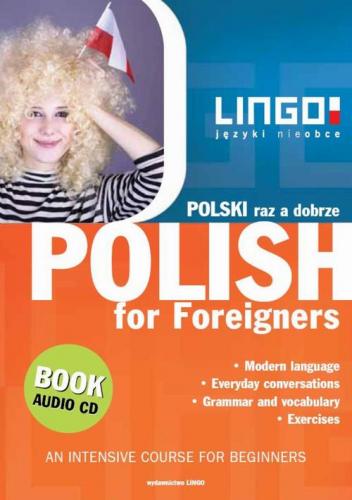głodni; pl. (m. prs); see – głodny
głodny (m.) – hungry
gościnność (f.); G. ~ości – hospitality
hol (m.inanim.); G. –u – lobby
imię (n.); G. imienia – name
jedna (f.)* – one
jedna (f.)**; G. –ej – one
kanapka (f.); G. –i; N. pl. –i – sandwich
kontakt (m.inanim.); G. –u; N. pl. –y – contact
kotlet schabowy (mnż. or mż.) G. –a a. –ø / –ego; N. pl. –y / –e – pork chop
LOT (m.inanim.); G. LOT–u; L. Locie – Polish National Airline
lotnisko (n.); G. –a – airport
miała*** – had
miłe (n.) – nice
może**** – maybe, perhaps
najdroższa (f.) – most expensive
nas (A. ← my) – us
nich (G. pl. ← one) – them
nowa (f.) – new
O! (exclamation) – Oh!
obok + G. – next to
oznaka (f.); G. –i – sign
Paryż (m.inanim.); G. –a – Paris
pierwsza (f.) – first
podróż (f.); G. –y; I. –ą – trip
podróżny (mos.)*****; G. –ego – traveler
Polka (f.); I. –ą – Polish woman, Pole
polskie; here: (nm. prs. pl.); see polski – Polish
reżyser (mos.); G. –a – director
również – also
słynny (m.) – famous
smaczne; here: (nm. prs. pl.); see – smaczny
smaczny (m.) – tasty, delicious
stewardesa (f.); G. –y; N. pl. –y – stewardess
ulica (f.); G. –y – street
USA; pl.; uninflected noun
was (A. ← wy) – you
zaskoczenie (n.); G. ~nia – surprise
zmęczeni; pl. (m. prs).; see – zmęczony
zmęczony (m.) – tired
It’s worth knowing
* Jedna – adjective
** Jedna – noun; inflected like an adjective; informal; “somebody” (about a woman).
*** Miała – past tense of verb mieć; feminine.
**** Może – here as a modal auxiliary, with whose help the speaker indicates that what is said is probably true.
***** Podróżny – noun; inflected like an adjective; N. pl. podróżni; G. / A. pl. podróżnych.
Syntactic structures and basic expressions for lesson 4
Kto to jest? – Who is that?
mieć na imię… – to be called; here: My name is…
Syntactic structures
Jedna z nich. – One of them.
Od przybytku głowa nie boli! – (proverb) Never too much of a good thing!
Tak jak ty. – Just like you.
Expressions / Supplementary Phrases
Czy mógłbym (m. prs.) / mogłabym (nm. prs.) się przedstawić? – May I introduce myself?
Czy pan / pani pochodzi z (Polski, Ameryki…)? – Do you come from Poland, America..?
Czy pan mówi / Czy pani mówi po angielsku, po polsku? – Do you speak English, Polish… ?
Naprawdę? – Really?
Przedstawiam ci / panu / pani / wam… . – Let me introduce you… .
How Does It Work?
Connection of adjectives with nouns:
(m.) sympatyczny pan, słynny reżyser || (f.) najdroższa dzielnica, dobra kanapka || (n.) ciekawe życie itd.
II . Possessive Pronouns – moja, twoja, jego, jej … cont.
ja → To jest moja koleżanka. ty → To jest twoja koleżanka.
on → To jest jego koleżanka. ona → To jest jej koleżanka.
ono → To jest jego koleżanka.
my → To jest nasza koleżanka. wy → To jest wasza koleżanka.
oni → To jest ich koleżanka. one → To jest ich koleżanka. cont. in lesson 5
It’s worth knowing
* The following verbs are inflected according to the conjugation pattern of the verb robić : lubić [(ja) lubię, (ty) lubisz] Imperf.; pochodzić [(ja) pochodzę, (ty) pochodzisz] Imperf.; przedstawić (się) [(ja) przedstawię (się), (ty) przedstawisz (się)] Perf.; zapłacić [(ja) zapłacę, (ty) zapłacisz] Perf.; nosić [(ja) noszę, (ty) nosisz] Imperf.
** The folowing verbs are inflected according to the conjugation pattern of the verb cieszyć się: popatrzeć [(ja) popatrzę, (ty) popatrzysz] Perf.; zobaczyć [(ja) zobaczę, (ty) zobaczysz] Perf.
■ Neuter nouns
Neuter nouns with hard stems end with the letter –o; Neuter nouns with soft stems or functionally soft stems end with –e, or –ę. There is a group of neuter nouns with –ę ending that form a base of basic diminutive nouns that describe young creatures, for example: cielę, prosię, zwierzę. There are other nouns with irregular declinations that end with –ę: imię, ramię etc. In informal Polish easier substitutes are often used (example: dziecię → dzieciak, cielę → cielak, prosię → prosiak etc.).
imię
Inflected forms: sg. G. imienia, D. / L. imieniu, pl. N. imiona,
